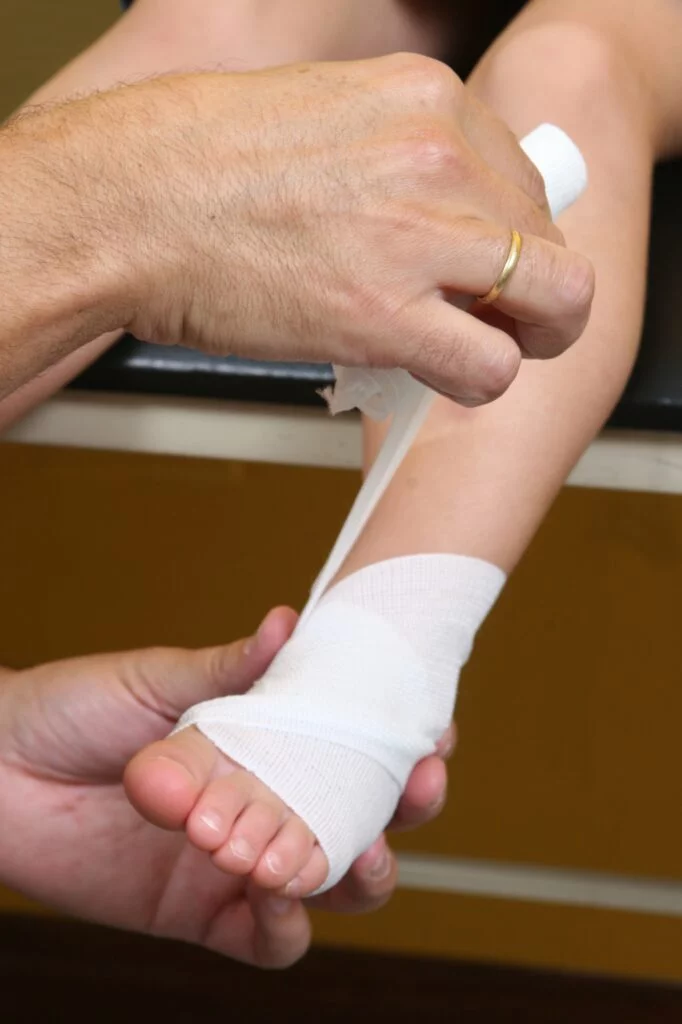Table of Contents
Overview of Plantar Fasciitis
4 Do’s and 4 Don’ts of Plantar Fasciitis
Plantar Fasciitis is one of the most common causes of heel pain. The plantar fascia is the thick band of tissue that runs along the bottom of your foot, connecting the heel to the arch of the foot and the toes. When this tissue becomes inflamed, it becomes a painful condition that causes an aching stabbing pain in the foot often worst when standing after long periods of rest. It is important to see your podiatrist to diagnose and treat plantar fasciitis, as putting off care can cause scar-like tissue to develop in the tissue that can lead to additional foot problems.
Plantar Fasciitis Don’ts:
- Don’t spend your days barefoot. With the spread of COVID-19, many of us are spending more time at home and may be tempted to go barefoot. Doing so, however, increases the strain on the plantar fascia. Consider a supportive pair of sandals or slippers for inside the house.
- Don’t purchase an over-the-counter heel cushion or “arch support” for your shoes and don’t assume your shoes have “enough” support. Most of these devices are ineffective at reducing the strain on the plantar ligament itself.
- Don’t continue to jog or walk long distances. Continuing to do so increases the chance of making the inflammation worse. Increased strain on the ligament can cause tearing in the ligament that can require surgical intervention.
- Don’t wait too long to see a podiatrist. At-home remedies rarely work, and the longer you leave the condition untreated, the worse it will get and the more difficult it becomes to treat conservatively. You may develop tears in the plantar fascia or swelling within the heel bone that may require surgical intervention.
Plantar Fasciitis Do’s:
- Do see your podiatrist for a proper diagnosis. Many conditions can cause pain in the heel, so being properly diagnosed by a medical professional is a must. Don’t wait until the pain becomes unbearable – it bears repeating, the longer the pain is present, the more difficult it becomes to treat.
- Do apply ice to your feet for 30 minutes to an hour. Take care to make sure that the ice doesn’t come into direct contact with your skin. Ice won’t cure plantar fasciitis, but it can provide temporary pain relief. Stay away from warm or hot water soaks as these can increase inflammation and make the condition worse.
- Do find other ways to exercise and stay healthy. If you are a runner, consider changing to an elliptical or bicycle until you heal. Swimming is also a great, low impact exercise that will keep you off your feet. Also, try to maintain a healthy weight. Obesity can be a risk factor for developing plantar fasciitis.
- Do wear a wedge or low heel instead of a flat shoe. This will reduce tension on the plantar fascia and ease symptoms similar to wearing an arch support.
Conclusion
The award-winning podiatrists at 1Foot 2Foot are true plantar fasciitis experts and masters of all forms of heel pain. They can treat your plantar fasciitis in a variety of ways. During your visit, your doctor will discuss which treatment may be right for you. In addition to traditional treatments such as stretching, appropriate supports/orthotics, and steroid injections, we are the first in Hampton Roads to offer EPAT (Extracorporeal Pulse Activated Technology) shockwave therapy, MLS Laser Therapy, and Stem Cell Recruitment Therapy, which are the most effective advanced treatments for plantar fasciitis without surgery, complication or downtime. To schedule your appointment, please contact us. Don’t let your plantar fasciitis pain keep you from living your best life.


